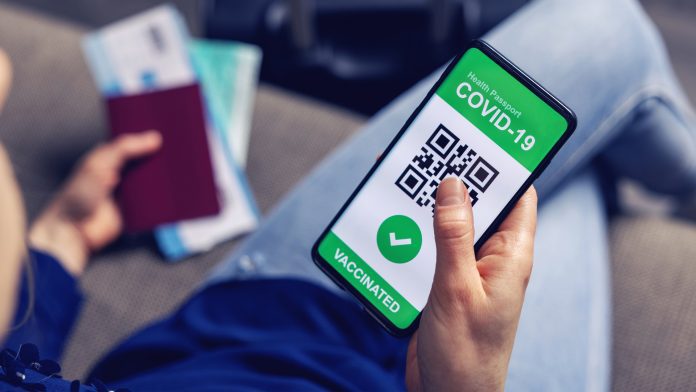
The implementation of Covid passports has been found to increase the uptake of vaccines in countries with otherwise low vaccination coverage.
In a modelling study led by researchers from the University of Oxford, the team identified that Covid passports enhanced vaccination uptake 20 days before and 40 days after introduction in countries with lower-than-average vaccination coverage.
The study is published in The Lancet Public Health.
What are Covid passports?
Covid passports – otherwise known as COVID-19 certification – are credentials that show a person’s complete vaccination status, negative COVID-19 test, or COVID-19 recovery certificate. Covid passports are required to enter specific public venues and events, such as concerts, restaurants, and hairdressers. In addition to potentially helping to prevent the spread of the virus, they may encourage the unvaccinated to get their inoculations, particularly those who perceive their own risk of hospitalisation or death from the disease as low, known as vaccine complacent groups.
Many countries globally have either considered or already mandated vaccine passports, but whether this public health intervention increases vaccine uptake is so far unclear. Previous survey-based evidence has suggested that participants reported they would be less likely to get vaccinated if Covid passports were introduced. In contrast, various media and national health offices have reported increases in uptake following the introduction of Covid passports.
Professor Melinda Mills, the leader of the research from the University of Oxford, said: “As mass vaccination programmes continue to play a central role in protecting public health in this pandemic, increasing vaccine uptake is crucial both to protect the individuals immunised and break chains of infection in the community. Our study is an important first empirical assessment of whether COVID-19 certification can form part of this strategy.
“Overall, we observed a significant uptick in anticipation of restrictions coming into place around 20 days before introduction, which lasted up to 40 days after, but the context of existing vaccination uptake, vaccine hesitancy, levels of trust in authorities, and pandemic trajectory was crucial to the impact.”
Impacts on vaccine uptake
The researchers comprised data from Covid passports introduced in April to September 2021 to vaccination uptake in six countries where certification was legally mandated (Denmark, Israel, Italy, France, Germany, Switzerland). The team employed modelling to estimate vaccine uptake in these countries without COVID-19 certification, based on vaccination uptake trends from 19 similar control countries without Covid passports.
The researchers estimated the number of additional doses per population attributable to the policy in the primary analysis and also examined the effects on uptake by age group and influence of implementing Covid passports in specific public venues, such as nightclubs.
The team observed a significant increase in uptake in countries where vaccination coverage was previously low. The number of additional vaccine doses per million people was 127,823 in France, 243,151 in Israel, 64,952 in Switzerland, and 66,382 in Italy due to the introduction of Covid passports.
However, there was no significant increase in vaccination in Germany and Denmark, where there were higher average vaccination rates before the implementation of Covid passports. Furthermore, Denmark introduced certification when the overall vaccine supply was still limited despite high demand. The main objective of the policy in Denmark was to increase testing before attending public venues instead of encouraging vaccinations, signifying the impacts of Covid passports beyond uptake.
The team found that daily COVID-19 cases reduced after the introduction of Covid passports in France, Germany, Italy, Switzerland but increased in Israel and Denmark. However, many countries introduced the certification in response to rising cases, making it challenging to examine their effect on reported infections.
The highest increase in vaccination rates following Covid passport mandates was demonstrated in people under the age of 30, and in Switzerland, where COVID-19 certification was used to restrict access to nightclubs and large events only, there was only an increase in uptake in those under 20-years-old. The team believe that the policy could be employed to effectively target vaccine uptake in certain groups, although more investigations on socioeconomic factors and ethnicity will be required to understand who the Covid passports can target.
Co-author of the study, Dr Tobias Rüttenauer, University of Oxford, said: “We know that certain groups have lower vaccine uptake than others, and it may be that COVID-19 certification is a useful way to encourage vaccine complacent groups, like young people and men, to get vaccinated. However, COVID-19 certification alone is not a silver bullet for improving vaccine uptake and must be used alongside other policies.
“Vaccine hesitancy due to lack of trust in authorities, which is common among some minority ethnic and lower socioeconomic groups, may be addressed more successfully through other interventions, such as targeted vaccine drives and community dialogue to generate more understanding about COVID-19 vaccines.”
Limitations and opportunities
The researchers have highlighted some limitations of their study, the first being that their data didn’t analyse vaccine uptake by sociodemographic, gender and ethnic groups. Furthermore, the COVID-19 certification policies differed in each country, including the phases of introduction, aims, eligibility criteria, level of enforcement, and pandemic context (case numbers and deaths). Vaccine hesitancy also varies across the countries, influenced by the historical experience of different social groups.
The team outlined further issues that policymakers should consider, such as the risk of exacerbating inequalities among communities with low uptake, generating inequality in access to public spaces where COVID-19 vaccine roll-out is staggered by age, entrenching digital divides if passes are electronic, and data privacy concerns.








